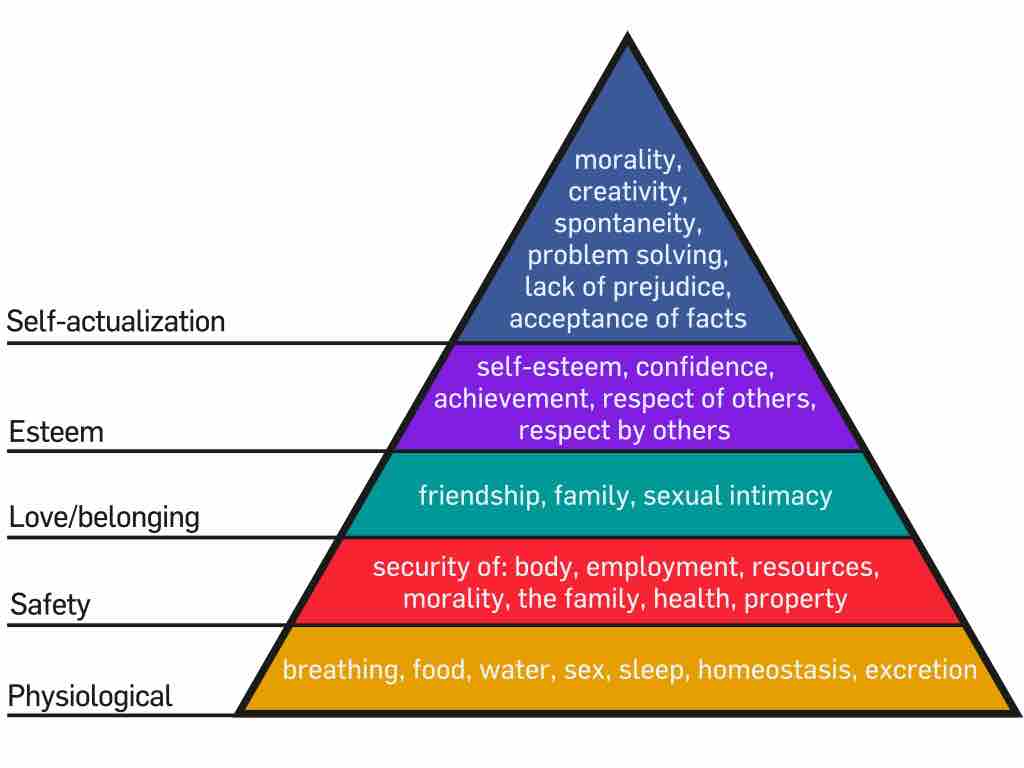Often called the “third force” in psychology, humanism was a reaction to both the pessimistic determinism of psychoanalysis, with its emphasis on psychological disturbance, and to the behaviorists’ view of humans passively reacting to the environment. Two of the leading humanistic theorists who made advancements in the field of personality psychology were Abraham Maslow and Carl Rogers.
Abraham Maslow's Humanism
As a leader of humanistic psychology, Abraham Maslow approached the study of personality psychology by focusing on subjective experiences and free will. He was mainly concerned with an individual's innate drive toward self-actualization—a state of fulfillment in which a person is achieving at his or her highest level of capability. Maslow positioned his work as a vital complement to that of Freud, saying: "It is as if Freud supplied us the sick half of psychology and we must now fill it out with the healthy half."
In his research, Maslow studied the personalities of people who he considered to be healthy, creative, and productive, including Albert Einstein, Eleanor Roosevelt, Thomas Jefferson, Abraham Lincoln, and others. He found that such people share similar characteristics, such as being open, creative, loving, spontaneous, compassionate, concerned for others, and accepting of themselves.
Personality and the Hierarchy of Needs
Maslow is perhaps most well-known for his hierarchy of needs theory, in which he proposes that human beings have certain needs in common and that these needs must be met in a certain order. These needs range from the most basic physiological needs for survival to higher-level self-actualization and transcendence needs. Maslow's hierarchy is most often presented visually as a pyramid, with the largest, most fundamental physiological needs at the bottom and the smallest, most advanced self-actualization needs at the top. Each layer of the pyramid must be fulfilled before moving up the pyramid to higher needs, and this process is continued throughout the lifespan.

Maslow's hierarchy of needs
Abraham Maslow developed a human hierarchy of needs that is conceptualized as a pyramid to represent how people move from one level of needs to another. First physiological needs must be met before safety needs, then the need for love and belonging, then esteem, and finally self-actualization.
Maslow believed that successful fulfillment of each layer of needs was vital in the development of personality. The highest need for self-actualization represents the achievement of our fullest potential, and those individuals who finally achieved self-actualization were said to represent optimal psychological health and functioning. Maslow stretched the field of psychological study to include fully-functional individuals instead of only those with psychoses, and he shed a more positive light on personality psychology.
Characteristics of Self-Actualizers
Maslow viewed self-actualizers as the supreme achievers in the human race. He studied stand-out individuals in order to better understand what characteristics they possessed that allowed them to achieve self-actualization. In his research, he found that many of these people shared certain personality traits.
Most self-actualizers had a great sense of awareness, maintaining a near-constant enjoyment and awe of life. They often described peak experiences during which they felt such an intense degree of satisfaction that they seemed to transcend themselves. They actively engaged in activities that would bring about this feeling of unity and meaningfulness. Despite this fact, most of these individuals seemed deeply rooted in reality and were active problem-seekers and solvers. They developed a level of acceptance for what could not be changed and a level of spontaneity and resilience to tackle what could be changed. Most of these people had healthy relationships with a small group with which they interacted frequently. According to Maslow, self-actualized people indicate a coherent personality syndrome and represent optimal psychological health and functioning.
Criticism of Maslow's Theories
Maslow's ideas have been criticized for their lack of scientific rigor. As with all early psychological studies, questions have been raised about the lack of empirical evidence used in his research. Because of the subjective nature of the study, the holistic approach allows for a great deal of variation but does not identify enough constant variables in order to be researched with true accuracy. Psychologists also worry that such an extreme focus on the subjective experience of the individual does little to explain or appreciate the impact of society on personality development. Furthermore, the hierarchy of needs has been accused of cultural bias—mainly reflecting Western values and ideologies. Critics argue that this concept is considered relative to each culture and society and cannot be universally applied.